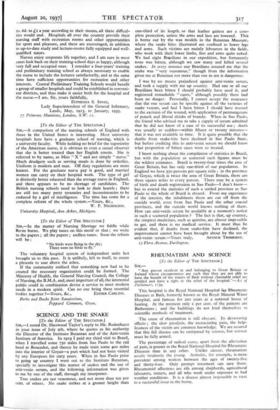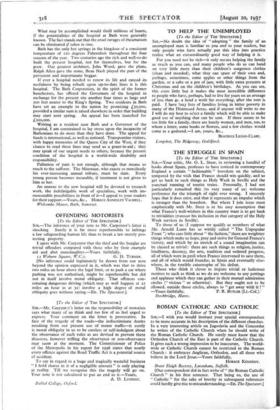RHEUMATISM AND SCIENCE
[To the Editor of THE SPECTATOR.]
SIR,— " Any person resident in and belonging to Great Britain or Ireland whose circumstances are such that they are not able to have the benefit of the waters of Bath without charitable relief are entitled and have a right to the relief of the hospital."—Acr of Parliament, 5739.
This hospital is the Royal National Hospital fa: Rheumatic Diseases at Bath, formerly known as the Royal Mineral Water Hospital, and famous for 200 years as a national house of healing. At the moment only 2 per cent. of the patients are
Bathonians ; and the buildings do not lend themselves to scientific methods of treatment.
The cause of rheumatism is still obscure. Its devastating effects ; the slow paralysis, the excruciating pain, the help- lessness of the victim are common knowledge. We are assured that this fell disease can be extirpated by science, but science must be fully armed.
The percentage of radical cures, apart from the alleviation
of pain, is greater in the Royal National Hospital for Rheumatic Diseases than in any other. Unlike cancer, rheumatism assails virulently the young. Arthritis, for example, is more prevalent among women between the ages of twenty-five
and thirty-four. Only prompt treatment can save them. Rheumatoid affections are rife among shepherds, agricultural labourers, miners, and all who work under exposure to bad weather conditions. It is a disease almost impossible to treat to a successful issue in the home.. What may be accomplished would thrill millions of hearts, if the potentialities of the hospital at Bath were generally known. The fact stands out that the cruel ravages of rheumatism can be eliminated if taken in time.
Bath has the only hot springs in the kingdom of a consistent temperature of 120 degrees Fahrenheit throughout the four seasons of the year. Two centuries ago the rich and well-to-do built the present hospital, not for themselves, but for the poor. Our greatest architect, John Wood, gave the plans, Ralph Allen gave the stone, Beau Nash played the part of the persistent and importunate beggar.
If ever a hospital needed to renew its life and extend its usefulness by being rebuilt upon up-to-date lines it is this hospital. The Bath Corporation, in the spirit of the former benefactors, has offered the Governors of the hospital in exchange for the present site another four times as large and 200 feet nearer to the King's Spring. Two residents in Bath have set an example to the nation by promising £50,000, provided a similar sum is raised elsewhere in order that building may start next spring. An appeal has been launched for £200,000.
Writing as a resident near Bath and a Governor of the hospital, I am constrained to lay stress upon the incapacity of Bathonians to do more than they have done. The appeal for funds is international, as well as national. Transpontine visitors, with happy memories of the Queen City of the West, if they chance to read these lines may send us a grant-in-aid ; they may speak of our urgent needs to others, because the present condition of the hospital is a world-wide disability and responsibility.
Palliation of pain is not enough, although that means so much to the sufferer. The Minotaur, who exacts so mercilessly his ever-increasing annual tribute, must be slain. Every young person becomes incurable, if treatment is not given to him or her.
An annexe to the new hospital will be devoted to research work, the indefatigable work of specialists, work with im- measurable possibilities in front of it—I appeal to your readers for their support.—Yours, &c., HORACE ANNESLEY VACHELL.
Widcombe Manor, Bath, Somerset.







































 Previous page
Previous page